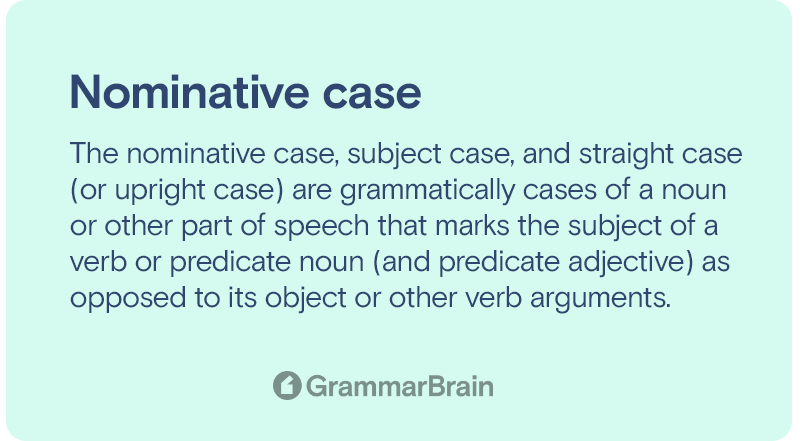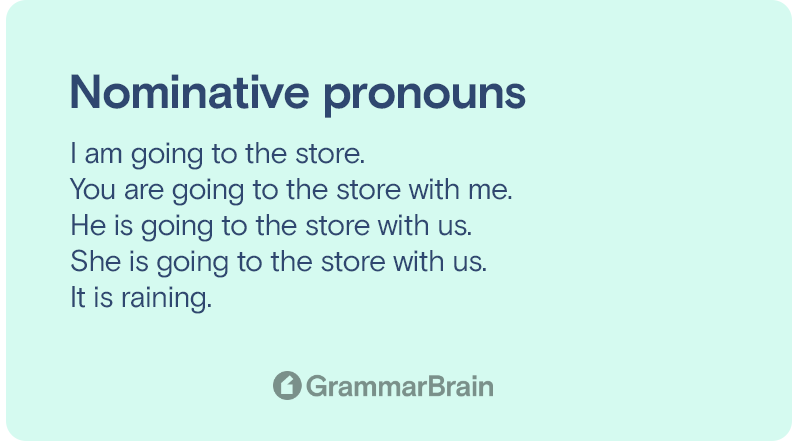What is the nominative case? When is it used? How is it used? These are all appropriate questions to ask when we hear about a nominative case. Get these questions answered (and more) in this complete English grammar guide.

What is a nominative case?
The nominative case, subject case, and straight case (or upright case) are grammatically cases of a noun or other part of speech that marks the subject of a verb or predicate noun (and predicate adjective) as opposed to its object or other verb arguments.
Definition
The nominative case is used mainly for a noun/pronoun when it is the verb-subject. In English, the nominative case is also used as a citation, which is the form of a noun or pronoun that is used when it is being mentioned for the first time.
Example:
For instance, in the sentence “John is reading a book,” the word “John” is in the nominative case because it is the subject of the verb “is reading.”
Similarly, in the sentence “The book is on the table,” the word “book” is in the nominative case because it is the subject of the verb “is.” In both of these examples, the words “John” and “book” are also in their citation forms.
Differences with other cases
When it comes to English grammar, the nominative case is the base form of a noun/pronoun. When a noun or pronoun is in the nominative case, it is the subject of that sentence. The other cases are objective, possessive, and reflexive.
The possessive case shows ownership, and the reflexive case indicates that the subject is also the object. Although there are different cases, most verbs only require using two: the nominative and objective.
For example, in the sentence: “I am going to the store,” “I” is in the nominative case because it is the subject of the sentence. And “the store” is in the objective case because it is the direct object of the verb “going.” The other cases are not used as often, but it is crucial to be aware of them.
| Nominative Case Singular | Nominative Case Plural |
| I | We |
| You | You |
| She, he, it, who | They, who |
| Object Case Singular | Object Case Plural |
| Me | Us |
| You | You |
| Her, him, it, whom | Them, Whom |
What are nominative pronouns?
In English grammar, a nominative pronoun is a personal pronoun used as the subject of a verb or as the complement of a linking verb. The most commonly used nominative pronouns are I, you, he, she, it, we, and they. These are also subjective pronouns because they indicate who is performing the verb’s action (or who is the subject of the sentence).
For example:
- I am going to the store.
- You are going to the store with me.
- He is going to the store with us.
- She is going to the store with us.
- It is raining.
- We are going to the store.
- They are going to the store with us.
As you can see in these examples, nominative pronouns can be either singular or plural. They can also be either masculine or feminine, depending on the gender they refer to.
When there is more than one subject pronoun in a sentence, they are usually separated by commas.
For example, all six of us are going to the store. They follow standard rules for English grammar regarding the case and number agreement.

How does the nominative case work?
In the English language, there are three main cases: nominative, objective, and possessive. The nominative case is used for the subject of a sentence, while the objective case is used for the object. The possessive case is used to indicate ownership.
Each of these cases has different rules for how words should be changed. For example, in the nominative case, nouns and pronouns are not changed, but verbs are conjugated to agree with the subject.
In the objective case, nouns and pronouns are changed to agree with the object. For example, the pronoun “he” would become “him” in the objective case. Finally, in the possessive case, nouns are changed to indicate possession, and pronouns are changed to agree with the possessor.
For example, the pronoun “his” would become “hers” if the possessor was female. While these rules may seem complicated at first, they will become second nature with a bit of practice.
How nominative case and verbs work together
English is notoriously difficult to learn due to its complex grammar rules. However, a firm understanding of grammar can go a long way toward mastering the language. One area of grammar that often trips up foreign speakers is nominative cases and verbs.
For example, the sentence “I am going to the store” is correct, while “Me am going to the store” is not. This rule can be confusing for those accustomed to languages where the verb changes depending on the subject.
Understanding nominative cases and gerunds
One of the challenges of learning English grammar can be understanding when to use nominative cases and gerunds. The nominative case is used for subjects and predicates, while gerunds are verb forms that end in “ing” and function as nouns. An excellent way to remember the difference is that nominative case is used for people or things doing the action.
For example, “I am writing a paper” would be written in a nominative case because “I” is doing the action. However, “Writing is my favorite hobby” would be written in gerund form because writing is the subject and “favorite hobby” is the predicate.
Understanding nominative case and adjectives
One of the most important aspects of English grammar is understanding how to use nominative case and adjectives.
The nominative case is used when the subject of a sentence is the doer of the verb, and it usually follows the form of the verb “to be.”
For example, the sentence “The man is walking his dog” would use a nominative case. Adjectives, on the other hand, describe or modify nouns and usually come before the nouns they modify.
For example, in the sentence “The red car is parked in front of the house,” “red” would be considered an adjective.
It’s important to understand the differences between these two grammatical concepts to use them correctly in your writing.
Understanding nominative case and nouns
One of the most fundamental concepts in English grammar is the notion of a case.
In grammar, the case refers to the function of a noun in a sentence.
There are three main cases in English: nominative, accusative, and genitive. The nominative case is used for the subject of a sentence, while the accusative case is used for the direct object.
The genitive case, on the other hand, is used to show possession.
Nouns can be either singular or plural, and they can be either common or proper.
Common nouns are general names for people, places, or things, while proper nouns are specific names for people, places, or things.
Most nouns in English are regular, meaning they form their plural by adding -s to the end of the word. However, some irregular nouns in English form their plural differently. For example, the plural of “man” is “men,” and the plural of “woman” is “women.”
Understanding nominative cases and subjects
The term “nominative case” refers to a noun or pronoun’s role in a particular sentence. The nominative case is also known as the subjective case. A noun/pronoun in the nominative case is the subject of a verb.
For example, in “John is writing a letter,” the word “John” is in the nominative case. This is because “John” is the subject of the verb “is writing.” Pronouns always in the nominative case include “I, you, he, she, it, we, and they.”
These pronouns are known as subjective pronouns. There are also objective pronouns that include: “me, you, him, her, it, us, and them.”
These pronouns are always in the objective case. In the sentence, “Susan saw John,” the word “John” is in the objective case as he is the object of the verb “saw,” not the subject.
Overall, nominative case pronouns are always subjects, while objective pronouns are always objects. Remembering this easy rule will help you to identify subjects and objects in English sentences.
FAQs
What are the different uses of the nominative case?
The nominative case is the “I” or “he/she/it” form of a noun/pronoun. For instance, in the sentence “I am going to the store,” “I” is the subject of the verb “am going” and is in the nominative case.
The nominative case for pronouns that are the subject of a clause, as in “She is taller than I am.” In both cases, “she” and “I” are in the nominative case.
Finally, you can always use the nominative case for nouns and pronouns. That renames the subject of a sentence or clause, as in “My best friend, she loves animals.” Here, “my best friend” is in the nominative case and is renaming “she.”
What are some common mistakes people make with the nominative case?
The common mistake with the nominative case is when the objective case would be more appropriate. For example, “Who saw the movie?” is in the nominative case, while “Whom did you see at the movie?” is objective.
Another common mistake is using the wrong form of a pronoun. For example, “I” is the correct pronoun when the subject of a sentence is the speaker. While “me” is the correct pronoun when the subject is the object of the sentence.
Finally, people might forget to use the nominative case when referring to themselves. For instance, instead of saying “Between you and I,” people usually say “Between you and me.”
While this wrong sentence or mistake is not as glaring as some others, it is still essential to be aware of it. And how it could get edited for clarity.
What is the purpose of a case?
A case indicates what function the word is performing in the sentence, whether it is the subject (nominative), a direct object (accusative), the indirect object or object of a preposition (dative), or if it is a possessive (genitive) form
What is the subject-verb agreement?
A singular subject must always be paired with a singular verb and a plural subject goes with a plural verb.
Inside this article
Fact checked:
Content is rigorously reviewed by a team of qualified and experienced fact checkers. Fact checkers review articles for factual accuracy, relevance, and timeliness. Learn more.
Core lessons
Glossary
- Abstract Noun
- Accusative Case
- Anecdote
- Antonym
- Active Sentence
- Adverb
- Adjective
- Allegory
- Alliteration
- Adjective Clause
- Adjective Phrase
- Ampersand
- Anastrophe
- Adverbial Clause
- Appositive Phrase
- Clause
- Compound Adjective
- Complex Sentence
- Compound Words
- Compound Predicate
- Common Noun
- Comparative Adjective
- Comparative and Superlative
- Compound Noun
- Compound Subject
- Compound Sentence
- Copular Verb
- Collective Noun
- Colloquialism
- Conciseness
- Consonance
- Conditional
- Concrete Noun
- Conjunction
- Conjugation
- Conditional Sentence
- Comma Splice
- Correlative Conjunction
- Coordinating Conjunction
- Coordinate Adjective
- Cumulative Adjective
- Dative Case
- Determiner
- Declarative Sentence
- Declarative Statement
- Direct Object Pronoun
- Direct Object
- Diction
- Diphthong
- Dangling Modifier
- Demonstrative Pronoun
- Demonstrative Adjective
- Direct Characterization
- Definite Article
- Doublespeak
- False Dilemma Fallacy
- Future Perfect Progressive
- Future Simple
- Future Perfect Continuous
- Future Perfect
- First Conditional
- Irregular Adjective
- Irregular Verb
- Imperative Sentence
- Indefinite Article
- Intransitive Verb
- Introductory Phrase
- Indefinite Pronoun
- Indirect Characterization
- Interrogative Sentence
- Intensive Pronoun
- Inanimate Object
- Indefinite Tense
- Infinitive Phrase
- Interjection
- Intensifier
- Infinitive
- Indicative Mood
- Participle
- Parallelism
- Prepositional Phrase
- Past Simple Tense
- Past Continuous Tense
- Past Perfect Tense
- Past Progressive Tense
- Present Simple Tense
- Present Perfect Tense
- Personal Pronoun
- Personification
- Persuasive Writing
- Parallel Structure
- Phrasal Verb
- Predicate Adjective
- Predicate Nominative
- Phonetic Language
- Plural Noun
- Punctuation
- Punctuation Marks
- Preposition
- Preposition of Place
- Parts of Speech
- Possessive Adjective
- Possessive Determiner
- Possessive Case
- Possessive Noun
- Proper Adjective
- Proper Noun
- Present Participle
- Prefix
- Predicate



